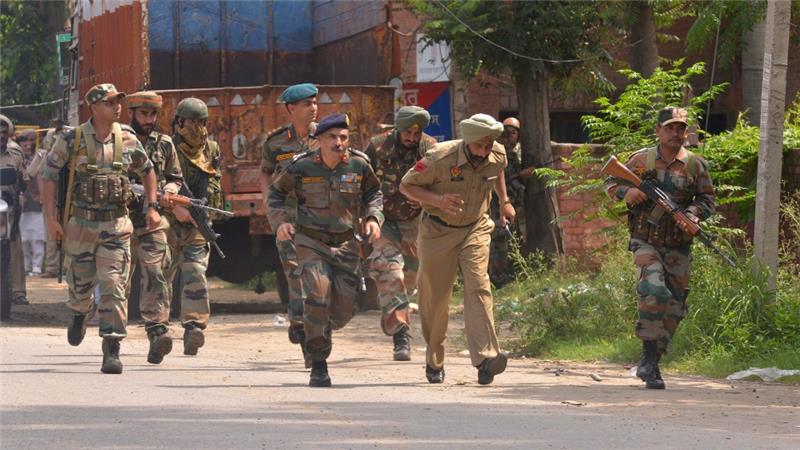Indians And Pakistanis Fight Bitter War On Social Media
India ordered increased security on the border with Pakistan after Monday's deadly assault [Reuters]

NEW DELHI: As Indian police overcame a group of gunmen dressed in military fatigues in Gurdaspur, Punjab on Monday following a 12 hour battle in which at least nine people were killed -- social media was witness to a pitched battle that pitted India against Pakistan.
Several social media commentators hit out at Pakistan, accusing the neighbouring country of having a hand to play in the attack.
Pakistan’s suspected role was also widely covered by the media.
Pakistanis, in turn, rubbished the claim, with #ModiAttacksGurdaspur trending in Pakistan
“This high level of double point fencing and security, with mine fields, vibration and movement sensors. BSF troops 24×7, night lighting on the J&K – Indian border which is visible from Space station, CCTvs and what not; and still saying infiltrators sneaked in?? joking is it ?? or taking bribes to let this happen???” a Pakistani user posted on defence.pk/forums.
Indians were not pleased.
The incident led to many advocating against friendly ties with Pakistan. The BCCI even appeared to rule out the resumption of Indo-Pak cricketing ties in the wake of the attack.
The attack comes as relations between India and Pakistan take a dip, with cross border firing claiming lives on both sides of the border.
The upswing in tensions follows what seemed to be a conciliatory move as Indian Prime Minister Narendra Modi accepted -- for the first time -- an invitation by his Pakistani counterpart Nawaz Sharif to visit Pakistan.
Relations between India and Pakistan have been strained off late, with the sit-down meeting at the sidelines of the Shanghai Cooperation Organization summit in Ufa, Russia, being the first of its kind between the two leaders in over a year. According to an Indian publication, the request for the meeting was initiated by New Delhi. Indian Foreign Minister S. Jaishankar reportedly made a request to Pakistani Foreign Secretary Aizaz Ahmed Chaudhry through the Indian High Commissioner to Pakistan on July 3, shortly after meeting the Pakistani High Commissioner.
Tensions have been high since the last time the two leaders met one-on-one, which was at PM Modi’s swearing-in ceremony in May 2014. Efforts to conduct similar meetings, such as a meet at November’s South Asian Association for Regional Cooperation summit in Nepal, did not materialise.
Since then tensions have simmered over a range of issues. The two sides have been engaged in cross-border firing along the Line of Control, claiming dozens of life and sparking rhetoric blaming the other camp from both India and Pakistan. There was also a flare up in rhetoric after PM Modi visited Bangladesh and more recently, after India’s covert operation in Burma. Another contentious issue is the release of 26/11 blast mastermind and leader of the Lashkar-e-Taiba Zakiur Rehman Lakhvi, who was recently granted bail released from Adiala Jail in Rawalpindi in April this year. In fact, when PM Modi met Chinese Premier Xi Jinping, the issue of Lakhvi’s bail was raised.
In spite of these tensions, whilst the two Prime Ministers have not met, meetings at other levels have continued. S. Jaishankar travelled to Islamabad in March this year, where he met Chaudhry and the two reportedly discussed strategies for renewing the Indo-Pak peace dialogue.
The meeting was significant as it was the first official step since India had cancelled secretary-level talks -- that had been agreed to during Sharif’s visit for PM Modi’s inauguration ceremony -- over Pakistan’s decision to meet Kashmiri separatist leaders in August last year. Speaking at the United Nations last month, Sharif said that India’s decision to cancel the talks had resulted in a “missed opportunity.” Modi, speaking at the UN the next day, responded saying that India was not opposed to talks, but would not participate “in the shadow of terror” and that it was upto Pakistan to “create a conducive atmosphere for talks.”
Further, tensions between the two countries have been high as border skirmishes across the Line of Control that began in late 2014, continue in 2015. The firing prompted Pakistan penning a letter to UN Secretary General Ban Ki Moon that invoked the UN to implement resolutions for a plebiscite in Kashmir. The letter marked a major reversal of Pakistan’s position for over a decade, sending bilateral relations between the two countries plummeting.
However, the first sign that the situation was changing came when Pakistan’s former National Security Adviser Major-General (Retd.) Mahmud Durrani met with NSA Ajit Doval and Foreign Secretary S. Jaishankar in March. The Citizen had the reported that the meeting could be an attempt at resuming back channel diplomacy.
Although diplomacy seems to have made a headway, incidents like Gurdaspur will go a long way in adversely affecting relations between the two countries.



